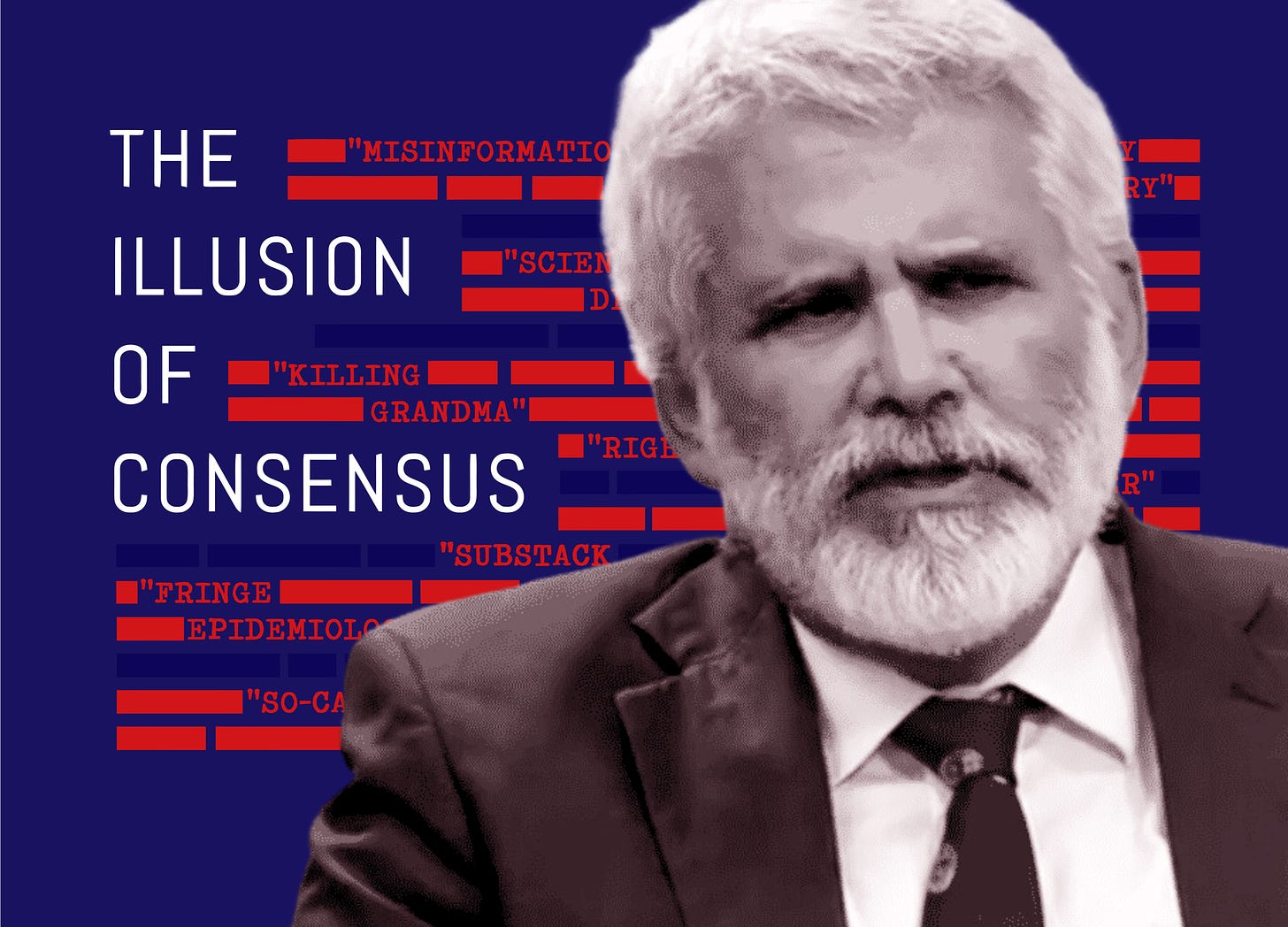“I have never had a podcast interviewer who is an academic, let alone of your stature. So I'm grateful for just having had a partner in this discussion that allows us to explore these other areas that I've never had an opportunity to explore.”
- Dr. Robert Malone on being interviewed by Dr. Jay Bhattacharya
Hello Illusion of Consensus readers,
Today, we are happy to bring you the second part of Dr. Jay’s podcast conversation with Dr. Robert Malone. Their conversation was so substantively dense, we had to split it into two portions. Dr. Jay and Dr. Malone crucially discuss the corruption at the heart of the FDA and CDC and how to potentially fix it. We hope you will come away from the conversation with more clarity on the sinister capture of our institutions.
— The Illusion of Consensus team
Dr. Malone on the U.S losing its international reputation for pharmaceutical safety:
The United States used to be considered to be the paragon, the beacon, the lighthouse for the world for pharmaceutical safety, for purity, potency, adulteration, regulatory scrutiny, and oversight. And has as somebody who has been traveling internationally all the way through this, I can tell you that that is no longer an American advantage.
We are now in a situation, and by contrast people's republic of China and the Indian government were perceived as relatively corrupt excellent sources for pharmaceutical supply chain and finished product.
The advantage of the United States as the paragon of integrity in pharmaceuticals and biologics is gone. We have lost that competitive advantage. There is no longer any reason for anyone in the world to not go to India, particularly for biologics, and China. In our actions over the last three years, we have basically conceded to India - kind of a frenemy. China, I argue, is a full-on competitor, enemy. And we have conceded a major industry to those two nation states and their economies through the malfeasance that's occurred within the FDA and the CDC. The world no longer sees us as a paragon of integrity in pharmaceutical regulation. They see us as incredibly corrupt.
The world no longer sees us as a paragon of integrity in pharmaceutical regulation. They see us as incredibly corrupt.
Which is no different from Italy or China or, you know, I argue that the, having had to dive into the regulatory documents for vaccines for India, for a client earlier on in this, the company was called Reliance. Rav may know what Reliance is. You know, owned by one of the richest men in the world, former, one of the senior people at the WEF, named Ambani, who made all his money off of Russian oil. So in any case, in India, by my reading, the regulations, the statutes, the guidance for vaccine safety and regulation and approval is more rigorous than it is at the FDA. That's where we're at.
Dr. Malone on regulatory capture in American science agencies
We've seen the CDC and the FDA embody regulatory capture. They personify it. One of the key issues here is that they have dual function. All of these agencies share the common problem of both being an advocate for the industry and a regulator for the industry. And for some reason, I'm being a little bit facetious, I'm more than a little bit, the advocacy for the interest of the industry always seems to supersede the regulatory oversight for the industry.
The advocacy for the interest of the industry always seems to supersede the regulatory oversight for the industry.
It gets bigger budgets and more emphasis. Okay, so this is just one, and we talk in the book, there's a myriad of different ways that regulatory capture manifests itself and the revolving door is clearly one of them.
Dr. Malone on how to potentially fix the revolving door in the pharmaceutical industry:
It's a very difficult one to figure out how to fix because you essentially have to create a, you know, it's hard to think about how to fix the revolving door without putting in place employment restrictions. in terms of what someone can practice once they leave the government. Now one solution would be you pay people well enough when they're in the government that they don't necessarily want to leave. They don't want to just, you know, spend their time there. Like for instance, the Patent and Trademark Office is notorious for this. Lawyers go to the PTO, spend their three to five years, and then they leave and then they've got all the contacts at the PTO so they can get patents through for their new clients.
It works the same way all the way through the government. And somehow we've got to fix the revolving door. In terms of FDA and CDC, because that's our focus, you and me, and it's the audience's focus in terms of what we've experienced here. And you're hearing now that I'm arguing that is just a one manifestation of a much, much broader problem that has been baked in and long existing. Okay? But in terms of those two agencies, it's, you know, I've heard people say everybody below, 13 has got to be fired. You got to move people up and just clean house. And we talked about this gonna be really hard to do unless you put in something like Schedule F, because you can't just go around firing people in the federal government because they got all kinds of protections from that. And like I said, it's usually a two-year protracted legal battle to terminate anybody in the federal government. So it's gonna be tough. And there's the whole logic of defunding, but if this is a case where potentially we're going to be cutting off our nose to spite our face.
Dr. Malone on the need for reforming the corrupted intelligence agencies:
We have to reform the administrative state because otherwise what we have is a self-perpetuating bureaucracy. And by the way, it's not just the bureaucrats, it is absolutely the intelligence community.
IT is basically, IT as you know it there in Silicon Valley, is basically a creature of the intelligence community. It was largely funded by the IC. Much of it is basically CIA and all the associated federal agencies and the intelligence community, we refer to it broadly. And that's why you're seeing basically the intelligence community together with the administrative state as a self-perpetuating entity that exists in parallel to the obligations of the federal government to serve the electorate.
The service to the electorate is no longer the primary objective of the federal government. It is service and perpetuation of the administrative state and the rights and prerogatives of the intelligence community and the alliances that they've created all over the world, including the Five Eyes Alliance, which is why you saw this lockstep behaviour between New Zealand, Great Britain, the United States, Canada, and Australia through the COVID crisis. That's the Five Eyes Alliance.



























Episode 12: Dr. Robert Malone and Dr. Jay Bhattacharya (Part 2)